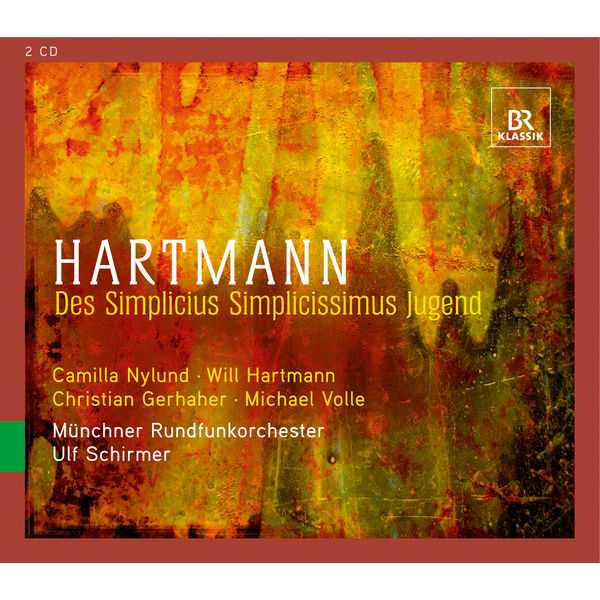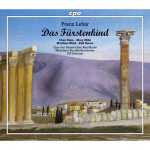
Composer: Karl Amadeus Hartmann
Performer: Camilla Nylund, Christian Gerhaher, Will Hartmann, Michael Volle
Orchestra: Münchner Rundfunkorchester
Conductor: Ulf Schirmer
Number of Discs: 2
Format: FLAC (tracks)
Label: BR Klassik
Catalogue: 403571900301
Release: 2009
Size: 517 MB
Recovery: +3%
Scan: yes
Simplicius Simplicissimus (2005 Bavarian Radio version by W. Hiller and R. Klimesch)
CD 01
01. Overture
Act I
02. Scene 1: Anno Domini (Chorus, Speaker)
03. Scene 1: Bub sei fleissig (Bauer, Simplicius)
04. Scene 1: Du sehr verachter Bauerstand (Simplicius)
05. Scene 1: Traum
06. Scene 1: Hunger und Durst (Landsknecht, Simplicius)
07. Scene 2: Da schaut die losgelassenen Teufel (Bauer, Speaker)
Act II
08. Scene 1: Komm, Trost der Nacht (Einsiedel)
09. Scene 1: Baume, lauter Baume (Simplicius, Einsiedel)
10. Scene 1: Ich sehe wohl (Simplicius, Einsiedel)
11. Scene 1: Unser lieber Vater (Simplicius, Einsiedel)
12. Scene 1: Simplici ein vernunftiger Mensch (Chorus, Speaker)
13. Scene 2: Nun Simplici, liebes Kind (Einsiedel, Simplicius)
14. Scene 2: So geht das schnode Leben hin (Einsiedel, Simplicius)
15. Scene 2: Mein lieber und wahrer, einziger Sohn (Einsiedel, Simplicius, Chorus)
16. Scene 2: Vater! Herzliebster Vater! (Simplicius, Chorus)
17. Scene 3: Hut Dich, Bauer, ich komm (Chorus, Feldwebel, Landsknecht, Simplicius)
18. Scene 3: Soll ich dich zeitlich oder ewig strafen (Feldwebel, Simplicius, Chorus)
CD 02
Act III
01. Bankett beim Gouverneur
02. 3 Tanze der Dame: No. 1. Sehr schnell
03. 3 Tanze der Dame: No. 2. Lustig
04. 3 Tanze der Dame: No. 3. Furioso
05. Als Manner sind wir durchaus ehrlich (Hauptmann, Gouverneur)
06. Hochedler Herr Gubernator (Landsknecht, Gouverneur, Simplicius)
07. Spiel 1: Simplex sieht erstmal einen Tanz (Sprecher, Simplicius, Landsknecht, Hauptmann, Gouverneur)
08. Spiel 2: Simplex das Lob der Jungfrau beschreibet (Speaker, Simplicius, Hauptmann, Gouverneur)
09. Bravo, Simplici, bravissimo (Governeur, Simplicius, Hauptmann)
10. Dank Herr, dass ihr mich so ehrt – Scene 1: Das ist brav von dir – Scene 2: Diese sehen ernstlich und etwas reputierlicher aus (Gouverneur, Simplicius, Hauptmann)
11. Scene 3: Diese sind eine schwere last fur die Wurzeln (Gouverneur)
12. Scene 4: Ihr alle martert und qualt unsaglich (Gouverneur, Chorus)
13. Scene 4: Gespriesen sei der Richeter der Wahrheit (Simplicius, Chorus, Speaker)
14. Karl Amadeus Hartmann and the original version of Simplicius Simplicissimus
The absolute highlight of Karl Amadeus Hartmann’s centenary year was the concert performance of his opera Des Simplicius Simplicissimus Jugend in Munich’s Prinzregententheater. It was the first performance of the original version, reconstructed by Wilfried Hiller and Robert Klimesch on commission from Bavarian Broadcasting. Besides the Münchner Rundfunkorchester under Ulf Schirmer, the performance had the good fortune of featuring a first-rate quartet of soloists including Christian Gerhaher, Will Hartmann, Camilla Nylund and Michael Volle. With this release, Simplicius Simplicissimus is now available in an exemplary recorded production both editorially and musically. While Hartmann described his work as an “opera” he avoided “stock operatic gestures” in the shaping of his musical language – it seems more likely to have been based on the style of Stravinsky’s L’histoire du soldat. The style of the work is directly related to the historical context of its composition: the original version was composed in 1934 1936 on the suggestion of Hermann Scherchen, who had lived in Swiss exile since 1933. The plot follows the destiny of a person threatened with the loss of himself and his world in the maelstrom of the Thirty Years War. Hartmann confronts this period with harsh refractions, nameless sorrow and biting satire. He dedicated the overture, composed in 1939, to Sergei Prokofiev, whose music embodied the style of the international avant-garde decried by the Nazis. Hartmann’s feelings when he set to work on the revision (1955/56) following World War II would be hard to describe! Incl. Bonus: Bernhard Neuhoff in conversation with Wilfried Hiller and Ulf Schirmer, with sound documents from Karl Amadeus and Elisabeth Hartmann.
Karl Amadeus Hartmann created several versions of his only full-length opera, Simplicius Simplicissimus, making it difficult for scholars and performers to establish a definitive version of the score. This recording, taken from a 2005 performance at Munich’s Prinzregentheater, is based on a reconstruction of Hartmann’s original 1936 version made by Wilfried Hiller and Robert Klimesch. Some of their choices seem odd; they include the 10-minute Prokofievian overture Hartmann added in 1939, which has little to do with the piece as a whole, but they omit the musically ravishing and dramatically critical Interlude the composer added at the same time. They also use the Hartmann’s original spartan orchestration and restore some spoken dialogue. The work sidesteps many of the conventions of opera, and resembles Stravinsky’s L’histoire du Soldat musically and formally, but it also includes operatic singing. It would be easy to enumerate the influences audible in the score — which include most obviously Stravinsky, Hindemith, Weill, Orff, and Schoenberg — but Hartmann’s visionary synthesis is individual and effective, and he doesn’t sound quite like anyone else. The opera, set during the Thirty Years’ War, is a transparent critique of the Third Reich, so it’s no wonder that it was not produced until after the war. The performance reveals it to be a work, that despite its quirkiness, has a raw power musically and dramatically. Ulf Schirmer offers strong leadership of Münchner Rundfundorchester and Die Singphoniker, turning in a committed and virtuosic performance that makes a good case for the opera. As the child Simplicius, soprano Camilla Nylund fully inhabits the role, and sings with strength and warmth. Will Hartmann is a vigorously forceful Hermit, but tends to sound strained in the upper register. Baritone Christian Gerhaher sings powerfully as the Mercenary. The sound of the live recording is clear and present. The album includes an interview, in German, with editor Wilfried Hiller and conductor Schirmer, and archival taped comments by the composer and his wife.



